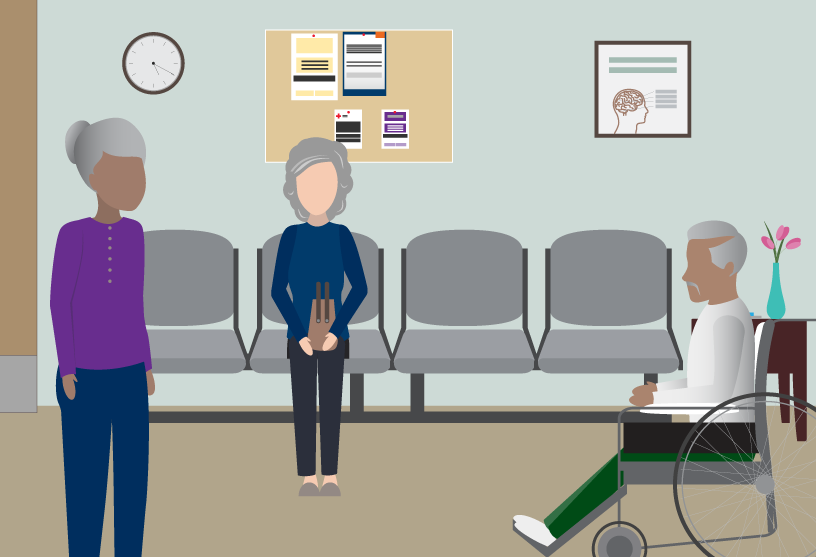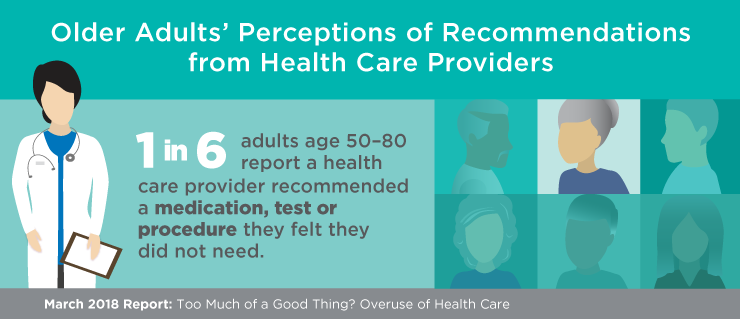
Introduction
“Low-value” health care services — medications, tests, and procedures that are unlikely to improve health outcomes — are not only unnecessary and wasteful, but also may create potential harm for patients.
Overuse of health care can result when providers order low-value services to satisfy what they may perceive to be patients’ preferences. But do older adults really believe that more health care is better? The University of Michigan National Poll on Healthy Aging asked a national sample of adults age 50–80 about health care services that may not be needed.
Is More Health Care Better?
Only 14% of older adults agreed that “when it comes to medical treatment, more is usually better.” The majority either disagreed with (43%) or were neutral (43%) about this statement.
However, older adults’ own experiences suggest overuse is common. One quarter (25%) agreed that their own health care provider often recommends medications, tests, or procedures that they do not think they really need. Twice as many (54%) agreed that health care providers in general often recommend medications, tests, or procedures that patients do not really need.
Conversations About Care That May Not Be Needed
One in 6 older adults (17%) reported that in the last year, a health care provider recommended a medication, test, or procedure that they felt they did not need. Among this group, the most common types of services thought to be unnecessary were a test (such as an x-ray or blood test) (43%) or medication (37%). Among those advised to get a service they felt they did not need, many went through with it despite their misgivings. In all, 50% of those who had received a recommendation for a test they didn’t think they needed ended up getting it anyway, and 41% of those who had been advised to get a medication they felt they didn’t need still filled the prescription.
On the other hand, nearly 1 in 10 older adults (9%) indicated that, in the last year, a health care provider told them that they did not need a medication, test, or procedure that they thought they needed. This situation usually involved a medication (44%) or test (40%), and less often a procedure (10%). When this happened, most older adults (79%) received an explanation from their health care provider about why they did not need the service they thought they needed; 60% completely understood the health care provider’s explanation, 30% understood somewhat, and 10% did not understand at all.
Implications
Conventional wisdom suggests that patients drive overuse of low-value health care services because of their health care preferences. Results of this poll suggest this may not be the case. Only 1 in 7 older adults think more medical treatment is usually better. However, 1 in 4 older adults agreed that their own provider often recommends medications, tests, or procedures they don’t think they really need, and 1 in 6 reported this happening during the past year. These findings indicate that health care providers may be making incorrect assumptions about their patients’ desire for services that have limited clinical value.
A key to reducing overuse of low-value services is understanding what happens when there is a difference between what patients think is needed and what health care providers think is needed. The current results suggest that when health care providers order a service that patients feel they do not need, patients often receive the service anyway. This is an opportunity for patients to ask questions to make sure they understand the purpose of the recommendation, and to discuss the extent to which the benefits of that test or medication is likely to be worth the risks and/or costs. Opening the door to these types of conversations can help the health care provider and patient understand each other’s viewpoint and together make decisions that are in the patient’s best interest.
Another common situation involves patients requesting a service they feel is needed, but that the health care provider believes is not necessary. This occurred in the past year for about 1 in 10 poll respondents. In the majority of these cases, health care providers reportedly explained why the service was not necessary and the majority of patients understood those explanations. This suggests that older adults may accept efforts to avoid overuse of low-value health services if health care providers take time to have conversations about how specific services will — or will not — impact their health outcomes.
Data Source and Methods
This National Poll on Healthy Aging report presents findings from a nationally representative household survey conducted exclusively by GfK Custom Research, LLC (GfK), for the University of Michigan’s Institute for Healthcare Policy and Innovation. National Poll on Healthy Aging surveys are conducted using GfK’s KnowledgePanel®, the largest national, probability-based panel in the U.S. Surveys are fielded two to three times a year with a sample of approximately 2,000 KnowledgePanel® members age 50–80.
This survey was administered online in October 2017 to a randomly selected, stratified group of older adults age 50–80 (n=2,007). Respondents were selected from GfK’s web-enabled KnowledgePanel® which closely resembles the U.S. population. The sample was subsequently weighted to reflect population figures from the U.S. Census Bureau.
The completion rate was 73% among panel members contacted to participate. The margin of error is ±1 to 2 percentage points for questions asked of the entire sample and higher among subgroups.
Findings from the National Poll on Healthy Aging do not represent the opinions of the University of Michigan. The University of Michigan reserves all rights over this material.
Read other National Poll on Healthy Aging reports and about the poll's Michigan findings, and learn about the poll methodology.
Citation
Kullgren J, Clark S, Singer D, Solway E, Kirch M, Malani P. Too much of a good thing? Overuse of health care. University of Michigan National Poll on Healthy Aging. March 2018. Available at: http://hdl.handle.net/2027.42/143213
Scholarly Publications
Kullgren JT, Malani P, Kirch M, et al. Older Adults’ Perceptions of Overuse. J Gen Intern Med. 2020;35:365-367. https://doi.org/10.1007/s11606-019-05434-4
Malani P, Kullgren JT. To curb overuse of healthcare services, engage older patients. Health Affairs Blog. March 13, 2018. doi:10.1377/hblog20180308.855164